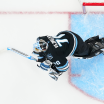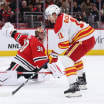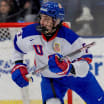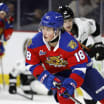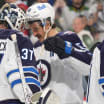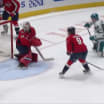Bobby and Brett Hull are still the only father and son to each score 50 goals in a season (and 600 or more in an NHL career). But they're far from the only father-son combinations to make an impact on the League.
Here (in alphabetical order) are some fathers and sons who have played (and are still playing) significant roles in the League during the past 100 years:
Successful father-son combinations in NHL
Gordie, Mark, Marty Howe among those who have played significant roles during past 100 years
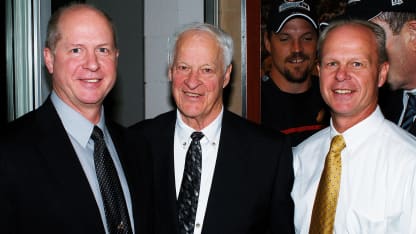
© Dave Reginek/Getty Images
The Apps: Syl (father); Syl Jr. (son)
Syl Apps was already a star athlete and a Canadian Olympian when the Toronto Maple Leafs signed him. He won the inaugural Calder Trophy in 1936-37, was a First- or Second-Team All-Star five times, helped Toronto win the Stanley Cup three times during his six seasons as captain and finished his NHL career with 201 goals and 432 points in 423 games despite losing two full seasons to World War II. He was a paragon of sportsmanship who won the Lady Byng Trophy in 1941-42, when he scored 18 goals and 41 points without taking a penalty. Many regarded him as the greatest player in Maple Leafs history and he was selected as one of the 100 Greatest NHL Players.
Apps' career was winding down when his son, Syl Apps Jr., was born in 1947. Like his father, Syl Jr. spent 10 seasons in the League, the majority with the Pittsburgh Penguins. He averaged 87 points during a four-season span with the Penguins in the mid-1970s and retired after the 1979-80 season with 606 points (183 goals, 423 assists) in 727 games.
The Bouchards: Emile (father); Pierre (son)
At 6-foot-2, 205 pounds, Emile Bouchard looked like a giant when he stepped onto the Montreal Canadiens defense for the 194-42 season; the average NHL player at that time was about 5-foot-8 and 165 pounds. Bouchard's physical presence helped reinvigorate the struggling Canadiens. Though Bouchard was mostly a stay-at-home defenseman, he became a useful offensive force and became adept at making the quick breakout pass that triggered the Canadiens' firewagon style of play. He became captain in 1948 and retired after the 1955-56 season as a four-time Stanley Cup winner. He's a member of the Hockey Hall of Fame and the Canadiens retired his No. 3 in 2009.
His son, Pierre Bouchard, spent eight of his 12 NHL seasons with the Canadiens and was a member of five Cup-winning teams. Their combined nine Stanley Cup championships are the most by any father-son playing tandem in NHL history.
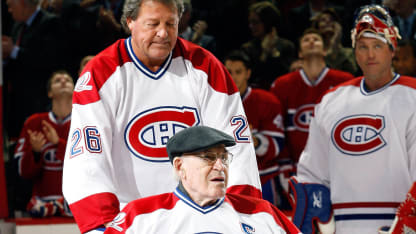
© Richard Wolowicz/Getty Images
The Domis: Tie (father); Max (son)
It's hard to imagine a father-son duo with more different styles of play; Tie Domi played 1,020 games and scored 104 goals during 16 seasons in the League, but he was far better known for piling up penalty minutes. Domi finished his NHL career in 2006 with 3,515, third on the all-time list, and had more than 340 in a season three times. He never had more than 15 goals or 29 points in one season.
Max Domi surpassed each of those marks last season as a rookie with the Arizona Coyotes, finishing with 18 goals and 52 points. Unlike his father, Max Domi was drafted for his hockey skills; he scored 105 goals and had 282 points in his final three seasons of junior hockey. But he's not completely unlike his father; Max missed nearly two months after breaking a bone in his hand during a fight with Calgary Flames forward Garnet Hathaway on Dec. 8.
The Folignos: Mike (father); Nick (son), Marcus (son)
Mike Foligno was taken by the Detroit Red Wings with the No. 3 pick in the 1979 NHL Draft and was an immediate hit, scoring 36 goals and finishing with 71 points in 80 games. But his best seasons came after he was traded to the Buffalo Sabres on Dec. 2, 1981. Foligno scored 30 or more goals three times with the Sabres, including an NHL career-high of 41 in 1985-86, and became known for his trademark jump, the "Foligno Leap," after scoring a goal. He retired after the 1993-94 season with 355 goals and 727 points in 1,018 games; since then, he has spent time as an assistant coach and scout.
Nick Foligno was taken by the Ottawa Senators with the No. 28 pick in in the 2006 draft. After four seasons with Ottawa, he was traded to the Columbus Blue Jackets, where he's in his second season as captain. Younger brother Marcus Foligno was taken by the Sabres in the fourth round (No. 104) in 2011 and is in his fifth full season in Buffalo.
The Hextalls: Bryan Sr. (father); Bryan Jr. (son), Dennis (son); Ron (grandson)
The elder Hextall was one of the NHL's best forwards during the late 1930s and 1940s. He scored 20 or more goals seven times with the New York Rangers, spending most of his time as the right wing on a line with Phil Watson and Lynn Patrick. Hextall led the NHL in goals in 1939-40, then scored the overtime goal in Game 6 of the Final to give the Rangers their third Stanley Cup championship; they didn't win another until 1994. Hextall led the League with 56 points in 1941-42 and was named a First-Team All-Star for the third consecutive season. He was inducted into the Hockey Hall of Fame in 1969.
Two of his sons, Bryan and Dennis, each started with the Rangers and had lengthy NHL careers; Bryan Jr. had two 20-goal seasons with the Pittsburgh Penguins and finished with 99 goals and 260 points in 549 games; Dennis played in the 1974 and 1975 NHL All-Star Games and finished with 153 goals and 503 points in 681 games. Ron Hextall, Dennis' youngest son, opted to become a goaltender instead of a forward and was an immediate hit as a rookie with the Philadelphia Flyers, winning the Calder and Conn Smythe Trophies and being selected to the First All-Star Team in 1986-87. He also became the first NHL goaltender to score a goal by shooting the puck into the (empty) net, and he set the single-season record for penalty minutes by a goaltender with 113 in 1988-89. Ron Hextall spent all but two seasons of his career with the Flyers, retiring in 1999 with 296 victories, and is Philadelphia's general manager.
The Howes: Gordie (father); Mark (son), Marty (son)
Gordie Howe owned many of the NHL's major records by the time he retired from the Detroit Red Wings in 1971, but one thing he'd been unable to do was play professionally with his sons. He got that chance two years later with the Houston Aeros of the World Hockey Association, who signed all three Howes. After six seasons in the WHA, Gordie returned to the NHL with his sons when the Hartford Whalers were one of four teams that joined the NHL. Gordie, already a member of the Hockey Hall of Fame, played one season before retiring for good.
Mark Howe became one of the NHL's best defensemen of the 1980s and helped the Flyers advance to the Stanley Cup Final in 1985 and 1987. He scored 197 goals and 742 points in 929 NHL games and joined his father in the Hockey Hall of Fame in 2011. Marty, a defenseman, played six games for Hartford in 1979-80 and 197 in the League before retiring in 1985.
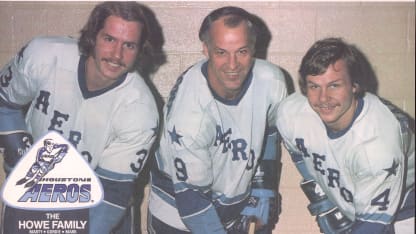
© B Bennett/Getty Images
The Parises: J.P. (father); Zach (son)
J.P. Parise was originally signed by the Boston Bruins and played briefly for the Toronto Maple Leafs, but found a home when he was traded to the Minnesota North Stars on Dec. 23, 1967. Though he was 5-foot-9, 180 pounds, Parise was one of the NHL's best cornermen; however, he scored as many as 27 goals and 75 points with the North Stars. His talent was recognized when he was selected to play for Canada in the 1972 Summit Series against the Soviet Union, finishing with two goals and two assists in six games. The North Stars traded him to the New York Islanders midway through the 1974-75 season and he quickly became a fan favorite. Parise returned to the North Stars and retired in 1979. He got to coach his son Zach Parise as well as future NHL stars such as Sidney Crosby and Jonathan Toews while running the program at Shattuck-St. Mary's school.
Zach went on to play at the University of North Dakota and was taken by the New Jersey Devils with the No. 17 pick in the 2003 Draft. He scored 31 or more goals in five seasons for New Jersey and helped the Devils reach the Stanley Cup Final in 2012. Parise came home that summer by signing a 13-year contract with the Wild; he scored his 300th NHL goal on Oct. 23, 2016.
The Patricks: Lester (father); Lynn (son), Muzz (son); Craig (grandson)
Lester Patrick had already put his stamp on hockey as a player and executive (he devised many of the rules that remain in the NHL to this day) when he was named general manager and coach of the expansion Rangers in 1926. The team was a hit on and off the ice, winning the Stanley Cup three times from 1928-40 and drawing big crowds at Madison Square Garden. Lester stepped down as coach in 1939 but remained as GM, and the 1940 championship team included two of his sons: Lynn, a forward, and Muzz, a defenseman. He was inducted into the Hockey Hall of Fame in 1947.
Lynn Patrick and his son, Craig Patrick, have joined him in the Hall of Fame; Craig Patrick, spent eight seasons as a player in the NHL, was an assistant coach with the 1980 U.S. "Miracle on Ice" team that won the gold medal at the Lake Placid Olympics, then built the Penguins teams that won the Stanley Cup in 1991 and 1992. Dick Patrick, son of Muzz Patrick, is president of the Washington Capitals.
The Stastnys: Peter (father); Paul (son), Yan (son)
Peter Stastny, 25, and his brother Anton Stastny, 22, defected from Czechoslovakia in 1980 and joined the Quebec Nordiques. They were the first major stars from the Eastern bloc to defect and play in the NHL. Peter won the Calder Trophy in 1980-81 and went on to become the second-highest scorer of the 1980s, trailing Wayne Gretzky. He was traded to the New Jersey Devils in 1990 and to the St. Louis Blues in 1994, and he retired in 1995 with 450 goals and 1,239 points in 977 NHL games. Stastny was inducted into the Hockey Hall of Fame in 1998.
Two sons, Yan Stastny and Paul Stastny, have played in the League. Paul has been the more successful; he is in his third season with the St. Louis Blues after eight with the Colorado Avalanche (the relocated Nordiques, who have retired his father's No. 26). He was a member of the United States team that won the silver medal at the 2010 Vancouver Olympics and scored his 200th NHL goal on Feb. 2.
The Sutters: Brent (father); Brandon (son)
Brent Sutter is one of the NHL's six Sutter brothers, and one of two who were part of the Islanders dynasty in the early 1980s. He was a member of three of New York's four Cup-winning teams; older brother Duane played on all four. He spent 10 seasons with the Islanders and six with the Chicago Blackhawks before retiring in 1998 with 363 goals and 829 points in 1,111 NHL games. He was a successful coach in junior hockey and coached the Devils for two seasons and the Flames for three.
Among his players with the Red Deer Rebels of the Western Hockey League was his son, Brandon Sutter, who was taken by the Carolina Hurricanes with the No. 11 pick of the 2007 draft. Brandon played four seasons with the Hurricanes, three with the Penguins and is in his second with the Vancouver Canucks. Brandon is the most successful of the second generation of Sutters; cousins Brett and Brody Sutter have been unable to crack the NHL on a full-time basis.
The Tkachuks: Keith (father); Matthew (son)
Keith Tkachuk, a high school star in the Boston area, spent one season at Boston University before joining the Winnipeg Jets, who took him with the No. 19 pick in the 1990 draft. Keith spent a decade with the Jets/Phoenix Coyotes franchise, scoring 50 goals in 1995-96 and 52 in 1996-97. The Coyotes traded him to the Blues on March 13, 2001, and he spent the remainder of his NHL career in St. Louis except for an 18-game stretch with the Atlanta Thrashers in 2006-07. He scored his 500th NHL goal on April 6, 2008 and reached 1,000 points when he scored on Nov. 30, 2008. He retired after the 2009-10 season with 538 goals and 1,065 points in 1,201 games and is a member of the U.S. Hockey Hall of Fame.
Matthew Tkachuk, born while his father was playing for the Coyotes, was taken by the Flames with the No. 6 pick in the 2016 draft; he made the Flames as an 18-year-old and had 31 points through his first 50 games.
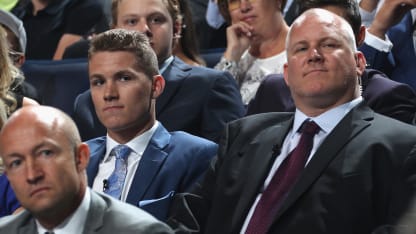
© Dave Sandford/Getty Images
Players aren't the only successful father son combinations …
The Bowmans: Scotty (father); Stan (son)
Scotty Bowman is the most successful coach in NHL history with more regular-season victories (1,244) and Stanley Cup championship teams (nine) than anyone. These days, he's a senior adviser of hockey operations with the Blackhawks, a team run by his son Stan, the vice president and general manager.
Stan Bowman joined the Blackhawks in 2001, when his father was still coaching the Red Wings, and became general manager on July 14, 2009. Under his watch, the Blackhawks won the Stanley Cup in 2010, 2013 and 2015. Scotty Bowman joined the Blackhawks in 2008. Including the three times he won the Cup since his arrival, he's been a part of 14 championship teams as a player or executive.
The Nolans: Ted (father); Brandon (son), Jordan (son)
Ted Nolan played three seasons in the NHL during the 1980s and spent six more as a coach with the Buffalo Sabres and New York Isanders, winning the Jack Adams Award as the NHL's top coach in 1996-97. His older son, Brandon, had an assist in six NHL games for the Carolina Hurricanes in 2007-08. Jordan Nolan, six years younger than Brandon, is in his sixth NHL season with the Los Angeles Kings and was part of their Stanley Cup-winning teams in 2012 and 2014. He payed against his father's team twice in 2014-15, during Ted's second stint with the Sabres. Father and son each went home victorious once.


